Review: MATILDA THE MUSICAL Stirs Hearts and Minds with Royal 'Bratness' and Wokeness
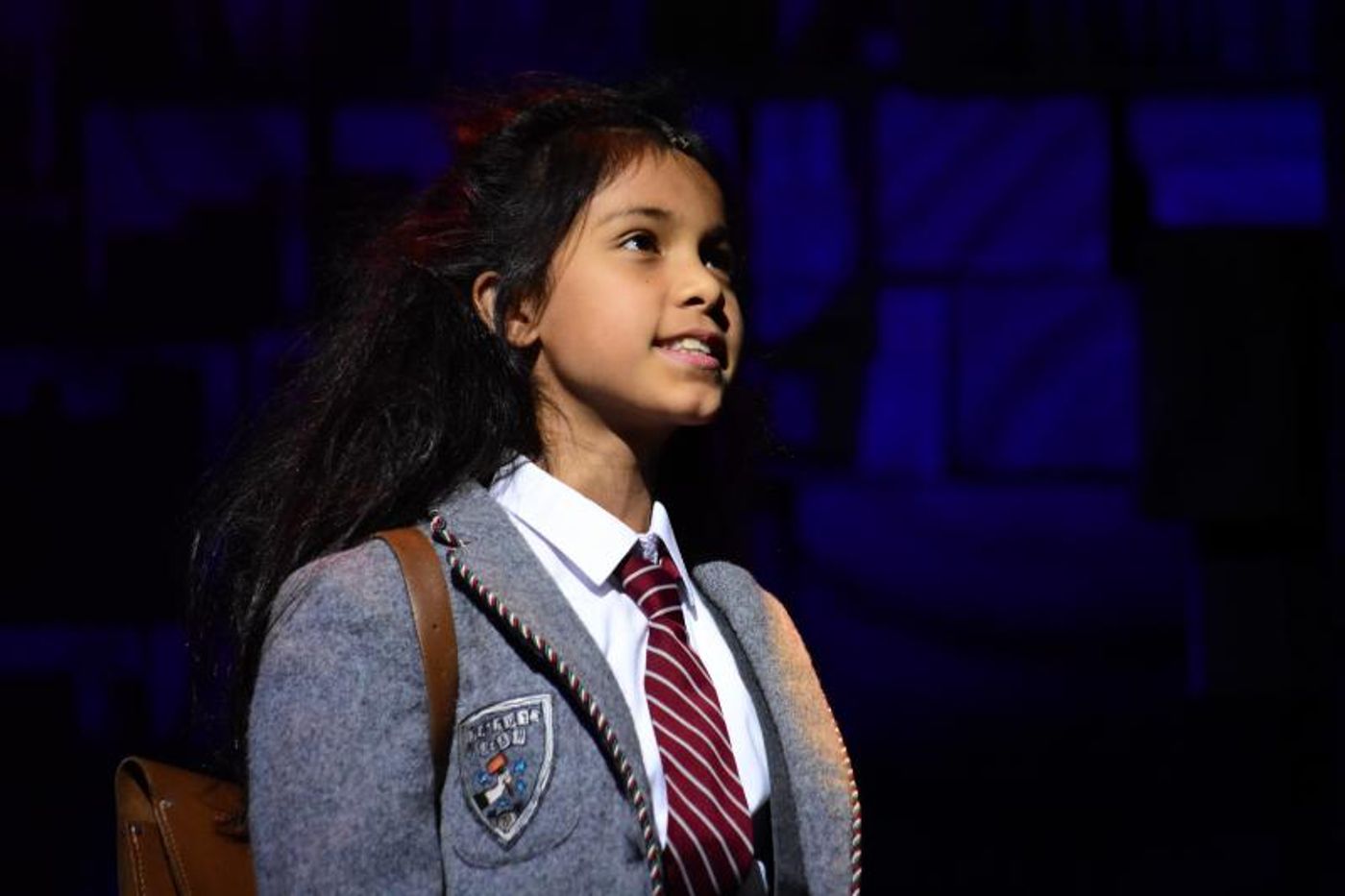
in Matilda The Musical.
![]()
Manila, Philippines - Good musicals are like magnets - they attract crowds from near and far that not even pervasive talks of a global pandemic could stop them from inflicting their charm on their willing patrons.
The Royal Shakespeare Company (RSC) international touring production of Roald Dahl's Matilda The Musical has finally invaded Manila, its band of little "maggots" mercilessly slaying the March 6 opening gala audience with their relentless energy, talent, and gumption.
Judging by the overwhelming audience turnout and reception at The Theatre at Solaire, the RSC theatrical brat has continued to mesmerize fans around the world, no thanks to Dahl, who left us with one of the most memorable children's books ever written and a musical to remember him by.
Leading the pack of adorable "twerps" is Sofia Poston, who, as Matilda, single-handedly disarmed a shookt crowd of kids and adults with her sophisticated and focused acting, gift of gab, and unkempt hair. But that is not to say that is all there is to this delightful musical.
Triumph in Cohesion, Focus and Balance
Matthew Warchus' direction is a triumph in cohesion and focus, with all the elements - set design, choreography, score, costumes, lights, and acting - working harmoniously. His choice to pay faithful homage to Dahl's dark material while splashing it with childish candor is well justified, and the overall result is one that is both appealing to the old and the young.
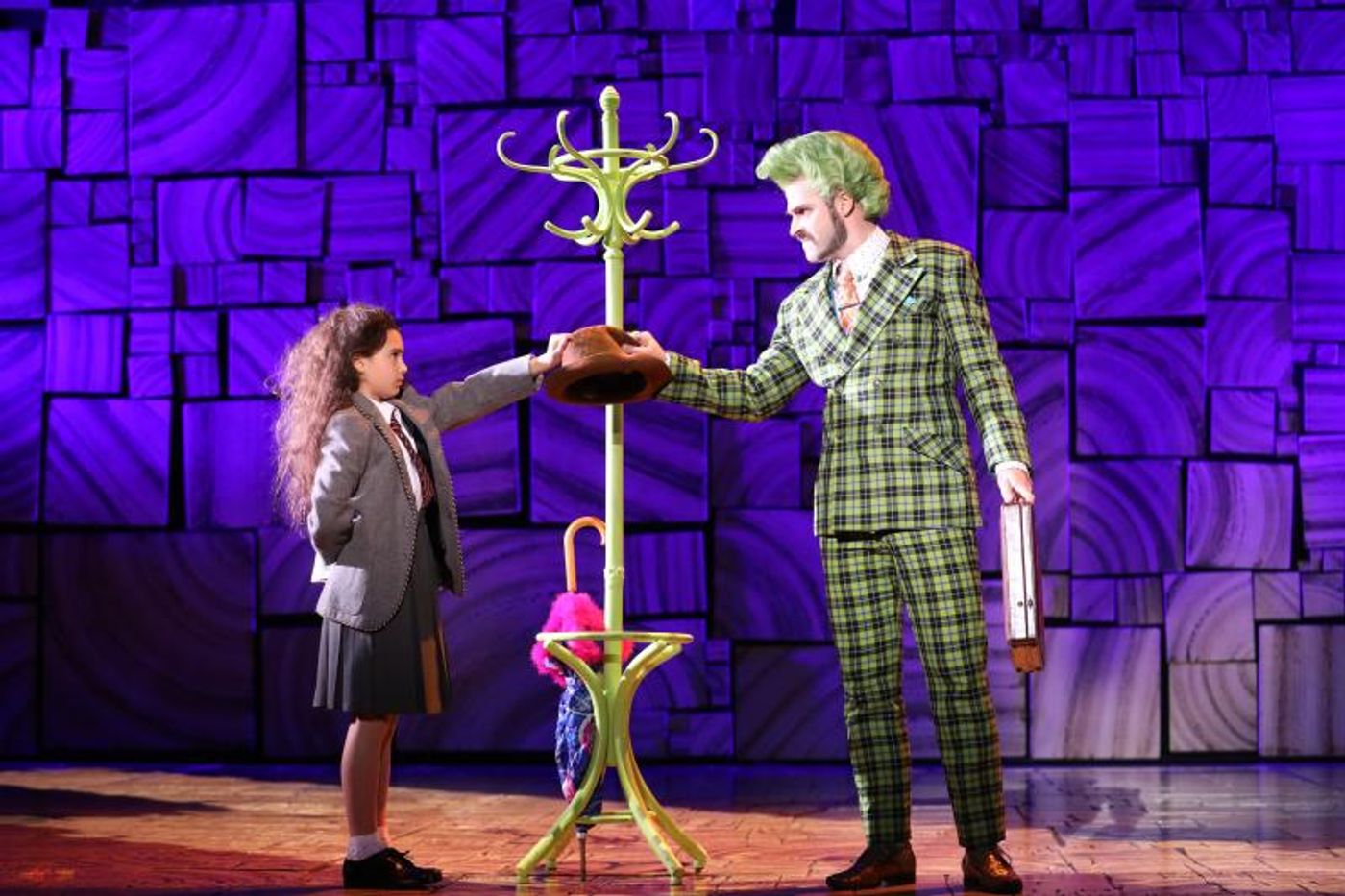
Stephen Jubber, Mr. Wormwood
The musical may be famous for its dark theme, but there are wacky and delightful moments that put everything back in balance - the awe-inspiring hanging sets of puzzle pieces (set design by Rob Howell), fun numbers like "Miracle," "Loud," and "Revolting Children," and some tender moments like "Pathetic," "This Little Girl," "I'm Here," and "My House."
A Jelly Bean Jar of Charm
Dahl notwithstanding, one of the most irresistible charms of the musical is Tim Minchin's score. The Australian's unmistakable dark sense of musical humor is palpably ubiquitous in his lyrics, and it complements so beautifully Dahl's brand of kindred charm. Minchin's score is a jelly bean jar of kiddie gibberish, childhood angst, and in-your-face chutzpah too irresistible even for a cynical adult.
The opening number "Miracle" is a right-starter: It opens the world of children seen in the eyes of parents told from the impressionable minds of children. The opening song then leapfrogs to "Naughty," a painfully charming take on how children's innocent balancing acts at young life are taken by adults as nothing but a mess and punishment to their busyness. By the second number, one may already get it (if you are not familiar with the story, or was living under a Precambrian rock when the movie slayed global theatres). In essence, this is not your typical sunny children's musical. It's a children's story for adults, all right, and take heed, the yakking and motherhood statements now belong to these loquacious brats.
The genius of Minchin's score is in its freshness - it's like watching the artist's famed spontaneous concert acts - and the overall effect is one that is raw, uncontrived, and real. It also helps that his score has that unbroken string of consistency, making all numbers a mere progression of each other. To an untrained ear, this may sound redundant and boring, but to a listening heart, this quality lends it a greater sense of musical and narrative focus.
Minchin's score pulsates with ditties that will haunt you for days - the sweet and haunting "When I Grow Up," the ridiculously funny "Telly," and the riotous finale "Revolting Children," which closes the two-act show with an explosive roar, to name a few. Minchin's child-like sensitivity and rebellious spirit could not have found a platform better than Matilda.
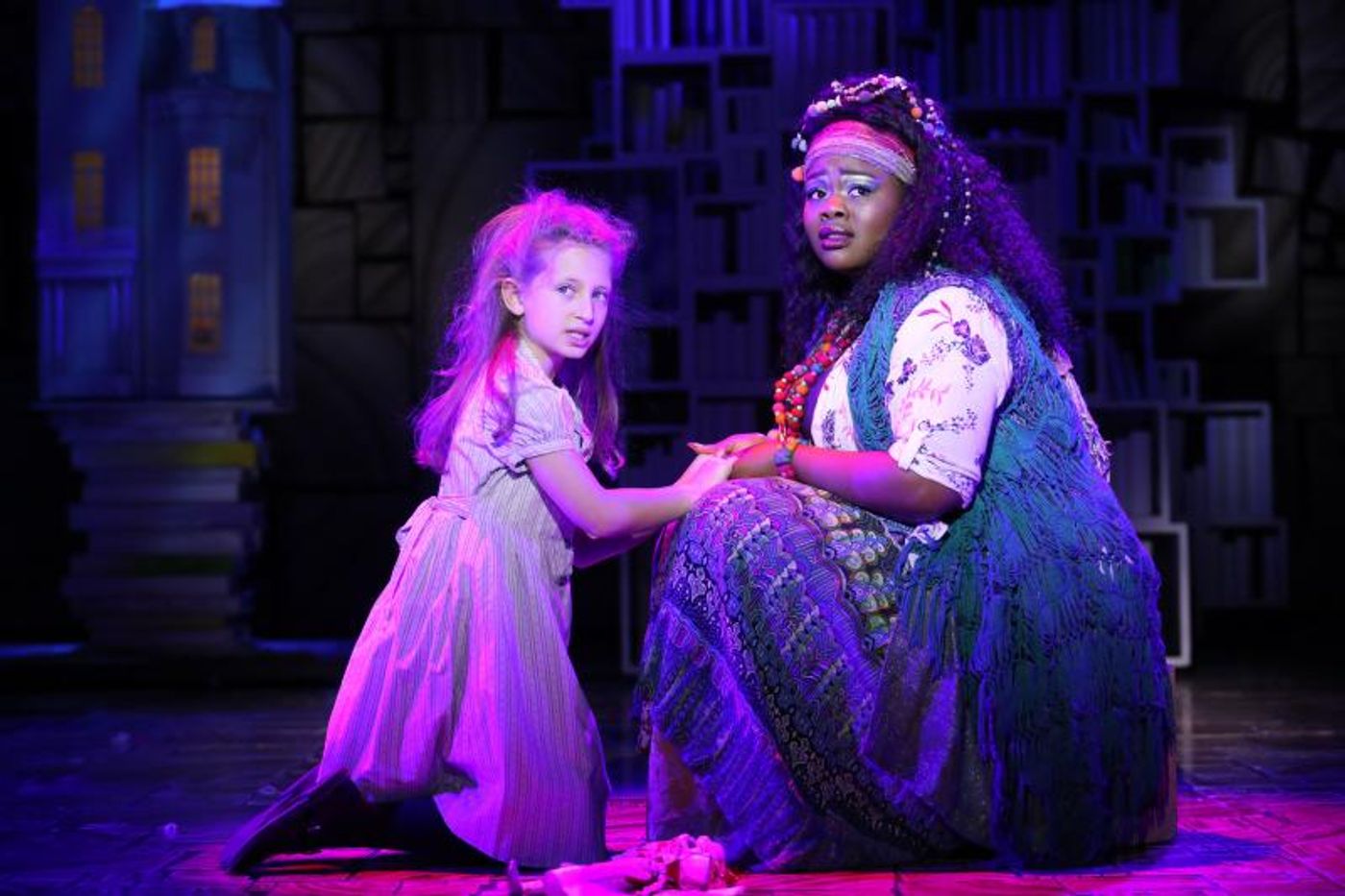
Nompumelelo Mayiyane, Mrs. Phelps.
From Popular Book to Libretto
Transforming a beloved and popular book into a libretto, needless to say, is both daunting and risky. In many instances, the original's nuances are somehow lost in the translation as one cannot compact a whole book into a two-hour production. From book to theater, Dennis Kelly has remarkably retained Matilda's dark appeal, its twists and turns as exciting as its story-within-a-story premise.
Matilda's kilometric narratives (a device employed to ensure narrative clarity) in the hands of a greenhorn could fall outrightly flat and dull. But in the deft hands of Kelly, these overwhelming lines become the umbilical cord that connects Matilda to its audience, making them see things more clearly from her very own perspective.
When the story of the great escapologist and his acrobat wife is woven into the narrative, the audience becomes a willing participant in an act they do not even want to see or partake in. As Matilda tells the story, one can almost find themselves rather ludicrously glued to their seat, hands over eyes and face, when they could actually leave and have none of it.
A Dynamic and Nostalgic Ride
Matilda's appeal owes itself considerably to Peter Darling's choreography that is as dynamic as Minchin's score. Darling scores an A in the innovative "School Song" number where the actors climb and glide on a make-believe puzzle wall, their movements accentuated by puzzle pieces that light up. On this frenzied number, one can almost smell the anticipation and anxiety of every child awaiting their teacher in the midst of their bully classmates.
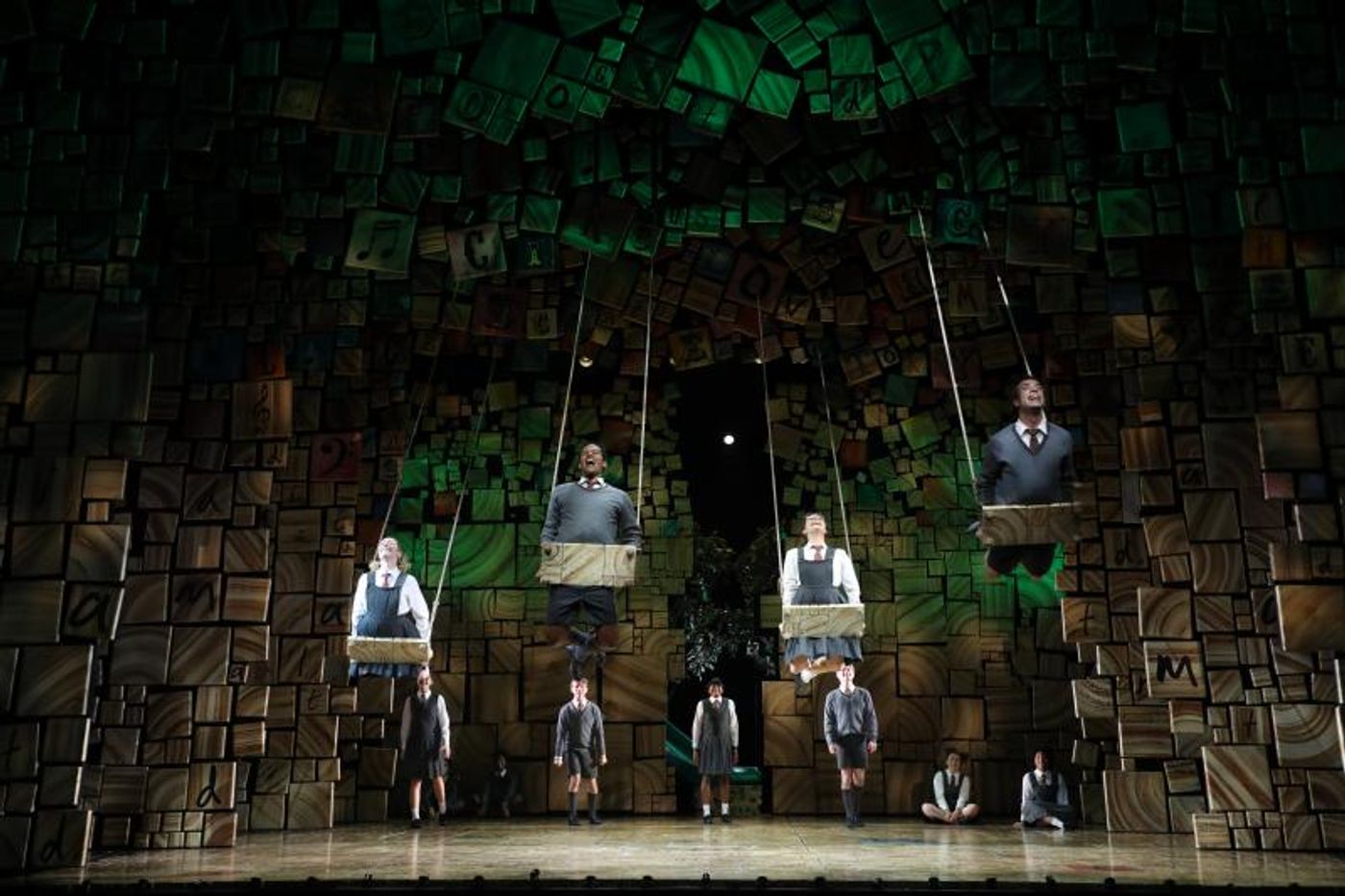
In the iconic "When I Grow Up" number, where children on swings glide towards the audience and back, one can't help but be taken for a dizzying nostalgic ride of childhood carelessness and freedom. This particular scene deserves to be the musical's iconic trademark.
Above all, Darling's genius is in the way his choreography showcases child movements that range from innocent to rebellious, from aloof to carefree, and from stoic to fun. I wish there had been more child actors. Still, since this is an international touring production, one can only praise the ingenuity of the production to utilize adult cast members as passably lovable tots.
Matilda and the Twerps
Poston and her gang of what Minchin calls "twerps" are a band of lovable little rebels. Young as they may be, they lend a huge heart to the musical with their unaffected acting and unreserved openness. Poston as Matilda essays with enviable straightforwardness the complexities of a girl so gifted yet so ignored. In return, her excellent performance was richly rewarded with a standing O, and together with the rest of the young cast, stirred the hearts and minds of adults in the theatre that night with her royal "bratness" and wokeness.
Rightfully deserving of special mention are Caleb Payne, who plays Eric with a stage presence that cannot be ignored; Jamie Kaye as Michael Wormwood, who plays Matilda's telly-addicted sibling with ridiculous nonchalance, and Matthew Leck as Bruce, who survives the riotous cake-eating number with sheer innocence and gusto.
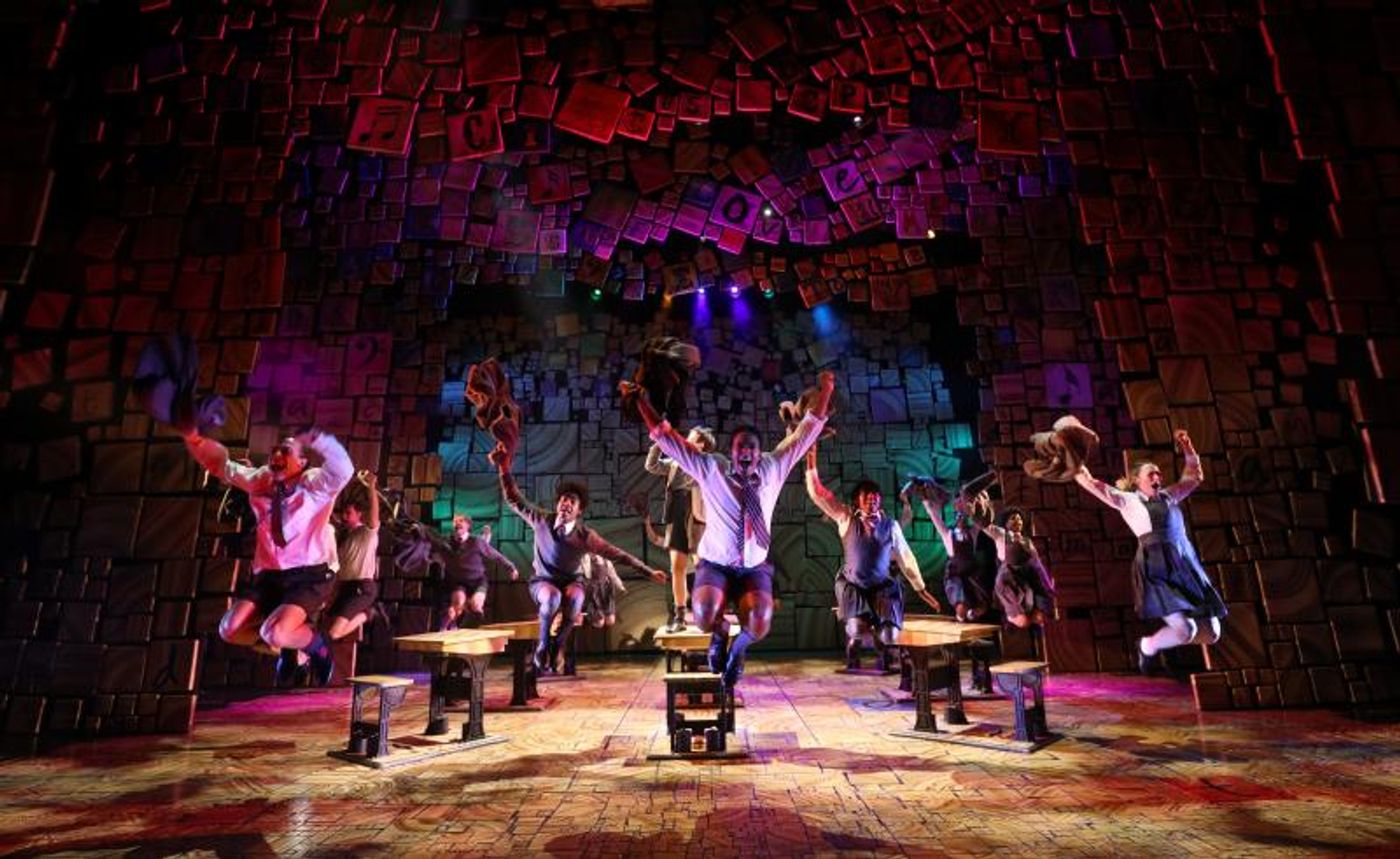
More Twerps
Providing strong support for the young cast is an ensemble of impressive adults who complete the Matilda experience: Haley Flaherty who gives an affective Miss Honey; Stephen Jubber and Claire Taylor as Mr. and Mrs. Wormwood, respectively, who provide an endless romp of unadulterated humor; Megan Saayman who scores a likable Henrietta, and Taylor Salgado who steals the show with her annoying yet charming Lavender. Kudos to the rest of the cast who deserve their share of the applause.
However, the glory of it all, undoubtedly, belongs to Hayden Tee as the villainous headmistress Miss Trunchbull, who tears through the stage and crunches 'em all with his weighty swag, ice-cold stare, and meanness extraordinaire. Watch her, I mean him, as he hams it up in "The Hammer" and slugs it out in "The Smell of Rebellion."
The Verdict
Brace yourselves for her royal "bratness" and wokeness; Matilda will stir your hearts and minds.
Presented by GWB Entertainment, along with GMG Productions & Virtus Live, Matilda The Musical runs now through 22 March 2020 at The Theatre at Solaire in Paranaque City.
Get the best deals on tickets to Matilda The Musical HERE.
Check out photos of the cast in action!
Photos: Oliver Oliveros, GMG Productions
Reader Reviews
Videos

